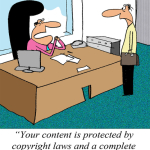
Can Lawyers Buy Keyword Ads On Each Others’ Names At Google? (Forbes Cross-Post)
“Competitive keyword advertising” occurs when a company buys the trademarks of its competition as keywords for search engine marketing. In the 2000s, it was one of the most interesting and hotly-contested issues of Internet Law as trademark owners filed many…

Online Dating App Grindr Isn’t Liable For Underage ‘Threesome’ (Forbes Cross-Post)
Many online dating services undertake some efforts to screen out dangerous or problematic members, but what should the law do if those screening efforts aren’t perfect? As a recent case involving Grindr shows, the answer is nothing. Grindr is an…

The Righthaven Debacle, 5 Years Later
You probably recall Righthaven, the now-defunct copyright enforcement entity (some might call it a copyright troll) that purchased newspapers’ copyrights so it could sue small-time bloggers who republished articles; after suing, it would demand financial settlements the bloggers couldn’t afford….

Blogiversary Celebration Part 4: How Internet Law and IP Law Have Evolved
This is the final part of my four-part series celebrating our 10th blogiversary. I asked the following question: What do you think is the most significant change in intellectual property law or Internet law over the past 10 years? This…

Blogiversary Celebration Part 3: How the Blogosphere Has Evolved
We’re continuing our celebration of the blog’s 10 year anniversary. I asked the following question: What do you think is the most significant change to the blogosphere since 2005? Some responses: Anupam Chander: The loss of Chander.com as a blog,…

Blogiversary Celebration Part 2: About the Blog’s Impact
Yesterday, we celebrated the blog’s 10 year anniversary. I apologize in advance for the self-serving nature of this post, but I wanted to know from blog readers: Tell us an anecdote about how the blog has made a difference to…

Happy 10th Blogiversary! (Blogiversary Celebration Part 1)
Today, we’re celebrating the 10th year anniversary of this blog! This is the first of a four-part series celebrating 10 years of blogging. A Short History of the Blog The blog traces its roots to my Internet Law course at…

Top 10 Internet Law Developments of 2014 (Forbes Cross-Post)
It’s time for my annual recap of the top Internet Law developments of the year. #10: Copyright Fair Use Tilts To Defense. Larry Lessig has famously said that “fair use in America simply means the right to hire a lawyer…

No Personal Jurisdiction Over Nasty Facebook Post–Burdick v. Superior Court
Let me see if I can sum up all of my knowledge about Internet jurisdiction in a few pithy bullet points: * Motions to dismiss for lack of personal jurisdiction often lose, so why should we get too wrapped up…

Bleg: Help Us Prepare For the Blog’s 10 Year Blogiversary
This blog launched on February 8, 2005, meaning that our 10th anniversary is just a couple of months away. Where did the time go??? With our big milestone looming, we’re cooking up some special features to help celebrate in style. It…
